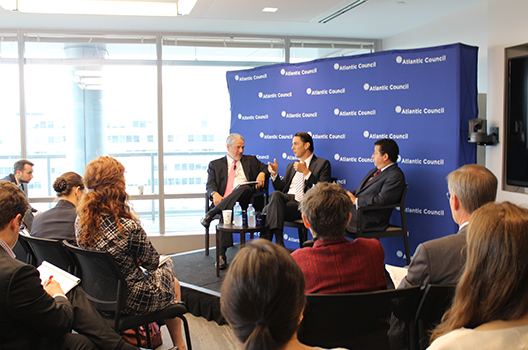 Missed the event? Check out the recorded webcast here
Missed the event? Check out the recorded webcast here
As Venezuela gets closer to an economic demise, the United States and the international community have unprecedented opportunity to support Central America and the Caribbean’s transition away from dubious alliance Petrocaribe and Caracas’ weakening energy diplomacy. Countries must take immediate steps to prevent destabilization should the Venezuelan economy – and thus its generous subsidies to Petrocaribe member-states – collapse.
The Atlantic Council’s Adrienne Arsht Latin America Center and Global Energy Center hosted a public discussion to address these developments one day before regional leaders gathered in Washington, DC, for the US-Caribbean-Central America Energy Summit. The event convened a key player in the summit’s preparations: Amos Hochstein, the US Department of State’s Special Envoy and Coordinator for International Energy Affairs along with Atlantic Council Energy Advisory Group Chair and Latin America Center Senior Nonresident Energy Fellow David L. Goldwyn. Adrienne Arsht Latin America Center Director Peter Schechter moderated the discussion.
The event also served as the launch the latest Atlantic Council report, The Waning of Petrocaribe? Central America and Caribbean Energy in Transition, written by David L. Goldwyn and Cory R. Gill. The report offers a compelling update of the energy landscape in Central America and the Caribbean and outlines eight recommendations for the May 4 summit and beyond.
After opening remarks from Jason Marczak, Director of the Adrienne Arsht Latin America Center Economic Growth Initiative, Schechter kicked the discussion off by asking Hochstein to frame the following day’s summit, hosted by US Vice President Joseph Biden. The summit will include the conclusion and presentation to the Vice President of the report by the US-Caribbean-Central American Energy Security Task Force. Goldwyn then pivoted this preview to outline the state-of-play analyzed in the Atlantic Council publication.
Further discussion included the role of the Central American Electrical Interconnection System (SIEPAC) in promoting energy integration in the region, the importance of renewable energy resources in the discourse, and the potential for natural gas as an alternative for power generation. Addressing the headwinds for Caribbean countries in attracting investment for a greater energy transition, both speakers agreed that the United States and international financial institutions continue to play a vital role in empowering the region.
The event and report followed the Adrienne Arsht Latin America Center’s previous work tracking Petrocaribe. In July 2014, the center released Uncertain Energy: The Caribbean’s Gamble with Venezuela, also written by Goldwyn and Gill.
